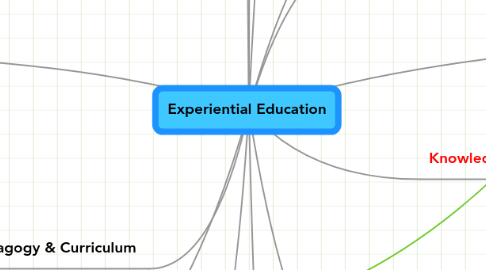
1. Peripheral Benefits
1.1. relationships
1.2. Community
1.3. Collaboration
1.4. relevance
1.5. engagement
1.6. Integrated Curricula
2. Barriers
2.1. Cost
2.2. perceptions
2.3. "less is more" vs. content standards
2.4. No teacher training
2.5. Preparation for traditional colleges
3. Theoretical basis
3.1. constructivism
3.1.1. Dewey
3.1.2. Social Constructivism
3.1.2.1. Vygotsky
4. Pedagogy & Curriculum
4.1. inquiry
4.1.1. White & Frederickson (1997, 1998)
4.2. Problem-Based learning
4.3. Problem-based learning
4.4. Model-eliciting Activities
4.4.1. Richard Lesh
4.4.2. Diefes-Dux et al (2004)
4.4.3. Group cognition
4.4.3.1. Zawojewski & Lesh
5. Possible research ideas
5.1. Potential sites
5.1.1. Watershed School, Boulder
5.1.2. Windy Gap, Jeffco
5.1.3. Balarat, DPS
5.1.4. Polaris, Ft. Collins
5.1.5. JCOS
5.1.6. RMSEL
5.1.7. Odeysee (DPS)
5.1.8. Compass Montesori
5.1.9. Eagle Rock
5.2. Potential Funding
5.2.1. GLEF (George Lucas Educational Foundation)
5.2.2. NSF
5.2.2.1. Reese Grants
5.2.2.2. Discovery Research K-12 (DR K-12)
5.3. Systems theory
5.3.1. thick description
5.4. Brain imaging
5.5. Jim Moravic as master teacher
6. Trips
6.1. heroe's journey
6.2. social
6.3. novelty
7. depth vs breadth
8. Transfer
8.1. Bransford (1982)
8.1.1. learning situation=recall ability
8.2. Near vs. Far
8.2.1. Basile
8.3. HS to college transition
8.3.1. Gonalez-Espada & Napoleoni-Milan
8.4. HS to college transition
8.4.1. Gonzalez-Espada & Napoleoni-Milan
9. Memory
9.1. Declarative
9.2. Episodic
9.2.1. Creating emotion
9.2.1.1. Jensen (1998)
9.3. Procedural
9.3.1. Novel Events
9.3.1.1. Anomalous data
9.3.1.2. Anomalous Data
9.3.1.3. Travel/ field-based learning
10. Knowledge
10.1. declarative
10.2. Procedural
10.3. Schematic
10.4. conditional*
10.4.1. Robert Gagne (1985)
10.4.2. Paris et al (1983)
10.4.3. Garner (1990)
10.4.4. Paris et al (1983)
10.4.5. Garner, (1990)
10.5. recall
10.6. Expert vs. Novice
10.6.1. expert=conditionalized
10.6.2. Bransford & Stein (1993)
10.6.3. Expert=better conceptualization
10.6.4. knowledge chunked around big ideas
10.6.5. Chi et al (1981)
11. Cognition
11.1. multiple modalities
11.2. Brain Plasticity
11.2.1. Michael Merzenich (UCSF)
11.2.2. Paula Tallal (Rutgers)
11.3. metacognition
11.4. Brain development
11.4.1. • Bruce…? At Baylor did a study looking at the use of inquiry based(?) and hands-on learning to catch PTSD kids up in brain development to their contemporaries
11.4.2. Brain Plasticity
11.4.2.1. Merzenich
11.4.2.2. Tallal
11.5. problem-solving skills
11.5.1. Hrabowski & Matow (1995)
